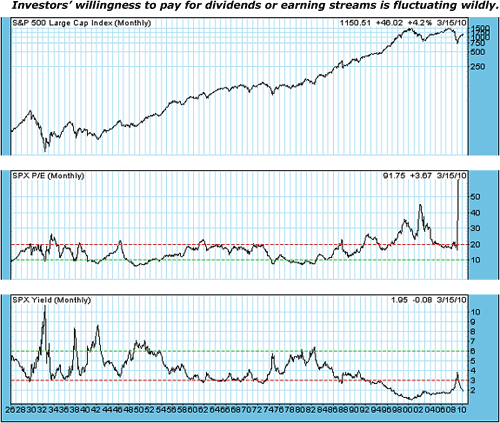The Economy Does Not Always Drive the Stock Market Trend
Stock-Markets / Stock Markets 2010 Mar 18, 2010 - 10:23 AM GMTBy: Claus_Vogt
 In the long run, economic development and — especially — corporate earnings are the main drivers of stock market performance. But this relationship is very loose. It becomes tight only if your time horizon is measured in decades.
In the long run, economic development and — especially — corporate earnings are the main drivers of stock market performance. But this relationship is very loose. It becomes tight only if your time horizon is measured in decades.
Shorter term, economic development and corporate earnings are often relatively inconsequential for the stock market. Why? Economic changes are superimposed by changes in the fundamental valuation of the stock market. That means investors’ perceptions and their willingness to pay for risk and income streams are unsteady. Over time, investors are paying very different prices for the same earnings or dividend streams.
Fundamental Valuations Are Fluctuating Wildly
Look at the following charts showing the S&P 500 since 1926, the Price-Earnings-Ratio (PER) and the Dividend Yield. As you can see, both fundamental ratios have been fluctuating wildly. The PER was as low as 7 and as high as 20-something.
During the stock market bubble of the late 1990s the PER even rose to more than 40. And during the past quarters the PER rose significantly higher. Obviously investors came to the conclusion that the dramatic slump in corporate earnings, especially in the financial sector, was an extreme outlier which should not be taken into account to value the stock market.
S&P 500 Index, Kurs-Gewinn-Verhältnis, Dividendenrendite, 1926 bis 2010

Source: www.decisionpoint.com
These severe fluctuations mean that dividends, earnings, and cash flows are fetching very different price tags in different times. A simple example may demonstrate my point: Suppose the PER is as low as 7 and the stock market index is at 100 points. Keep earnings constant, but let the PER rise to its upper range at 21. Now the index rises from 100 points to 300 points. Let’s go a step further to a bubble PER of 42. In this case, the index doubles to 600 points. Same index, same companies, same earnings, but very different Price-Earnings-Ratios lead to this bandwidth of 100 to 600 points. And this bandwidth has been a reality in the past 30 years!
This example makes clear how secondary the economic background and even corporate earnings are to analyze and evaluate the stock market. But there is one major exception to this rule: Recession.
You Better See Recessions Coming
Whenever a recession is in the offing, you have invaluable economic information at your hand. This information is extremely important for the stock market and for your investment strategy. Why? Every recession has been accompanied by a severe stock bear market. That’s why I constantly look at my leading economic indicators, which enabled me to predict the recessions of 2001 and 2007-2009.
Right now they do not yet forecast an imminent recession. Hence, in the current situation it is ideal to painstakingly analyze the latest economic data release du jour. It may be fun to do so for those inclined. But it doesn’t help you in forecasting the stock market. I rate this regular data release ballyhoo as noise you can easily ignore.
 |
| History tells us that the economy is vulnerable to a renewed and relatively swift turn for the worse. |
That doesn’t mean I do not follow economic development. But I am only interested in deciding whether the incoming data is starting to point to the end of the current economic rebound or not. Everything else is inconsequential.
We are living in a post bubble world. And history tells us that the economy is vulnerable to a renewed and relatively swift turn for the worse in this environment. After all, this rebound is the result of massive governmental stimulus, bail outs and market manipulation by the Fed.
It follows that this rebound is dubious and fragile. But even in this scenario the leading economic indicators will pick up some deterioration before the next down wave gets started. Currently, they are doing nothing of the sort.
Best wishes,
Claus
Weiss and Weiss Research analysts offering the latest investing news and financial insights for the stock market, including tips and advice on investing in gold, energy and oil. Dr. Weiss is a leader in the fields of investing, interest rates, financial safety and economic forecasting. To view archives or subscribe, visit http://www.moneyandmarkets.com.
© 2005-2022 http://www.MarketOracle.co.uk - The Market Oracle is a FREE Daily Financial Markets Analysis & Forecasting online publication.



